2025 Zahner Conservation Lecture Series
Each summer, the Highlands Biological Foundation has hosted evening lectures at the Highlands Nature Center focused on the theme of natural history and conservation, a tradition that began in the 1930s. Today, these lectures are known as the Zahner Conservation Lecture Series – named for the significant contributions of Dr. Robert Zahner and his wife Glenda, of Highlands, to land conservation efforts on the Highlands Plateau.
Highlands Nature Center
930 Horse Cove Rd
Directions | Parking Info
Thursday Evenings
June 12th – August 14th at 6:00 PM
(excluding July 3rd)
Free Admission
Open to the public.
No registration necessary.
These lectures serve to educate and inspire the public through a series of talks from well-known regional scientists, conservationists, artists, and writers. The series is made possible by donations from numerous individuals and local organizations.
2025 Past Lectures
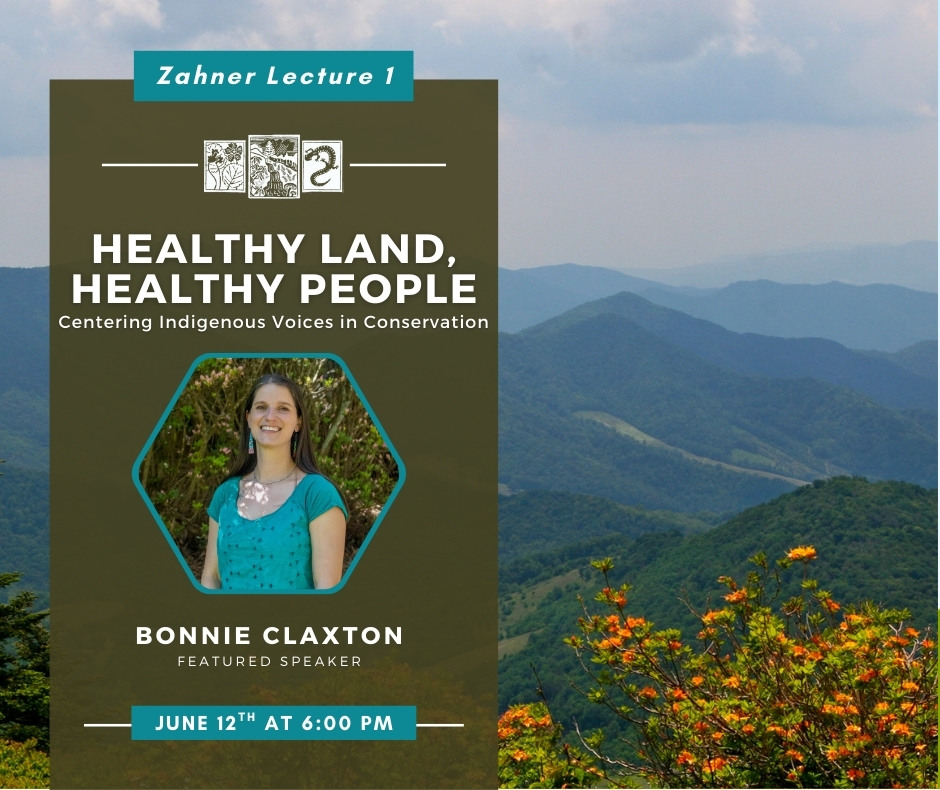
Healthy Land, Healthy People: Centering Indigenous Voices in Conservation
Featured Speaker
Bonnie Claxton (Chickasaw) Deputy Director, The Center for Native Health
Date: Thursday, June 12th
Time: 6pm – 7pm
Cost: FREE
Sponsored by Diane Lennox & Paul Manos, Janet & Scott Clarke, Richard Yow, and Liz Sargent.
The health of the land and the health of the people are deeply interconnected—a truth long understood by Indigenous communities. Yet, conservation efforts often overlook Native voices, traditional ecological knowledge, and Indigenous-led solutions. This talk will explore the importance of Indigenous leadership in environmental stewardship and offer practical ways for non-Indigenous allies to support and uplift these efforts. Through insights from the Center for Native Health’s Land & Wellness Program, we will discuss the role of land-based healing, policy, and community-driven solutions in restoring balance between people and place.
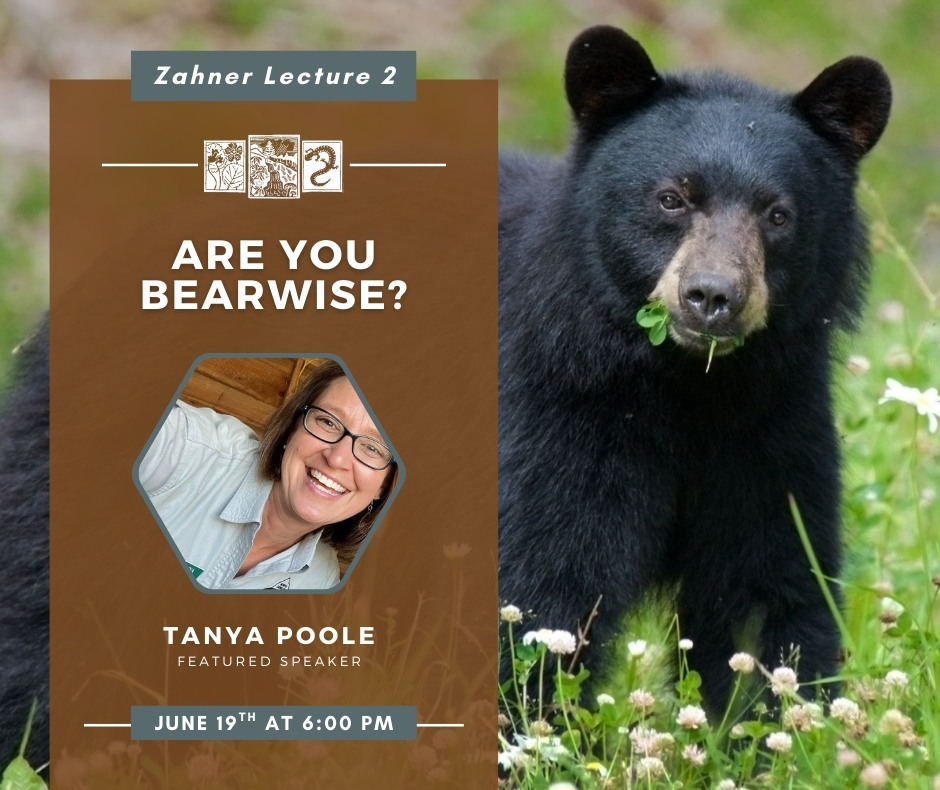
LECTURE 2
Are You BearWise?
Featured Speaker
Tanya Poole, Conservation Initiatives Engagement Coordinator
Date: Thursday, June 19th
Time: 6pm – 7pm
Cost: FREE
Sponsored by Karen Patterson.
It’s spring and you know what that means. Warmer temperatures, beautiful flowers, trees blooming, and people venturing out to enjoy it all. It turns out black bears are coming out in large numbers to enjoy some of the same things that humans enjoy. Learn about the conditions that contribute to the black bear population continuing to thrive in Western North Carolina in proximity to so many people. Tanya Poole, Conservation Initiatives Engagement Coordinator for NC Wildlife Resources Commission, discusses BearWise strategies recommended by wildlife experts that will help people better coexist with these amazing animals.
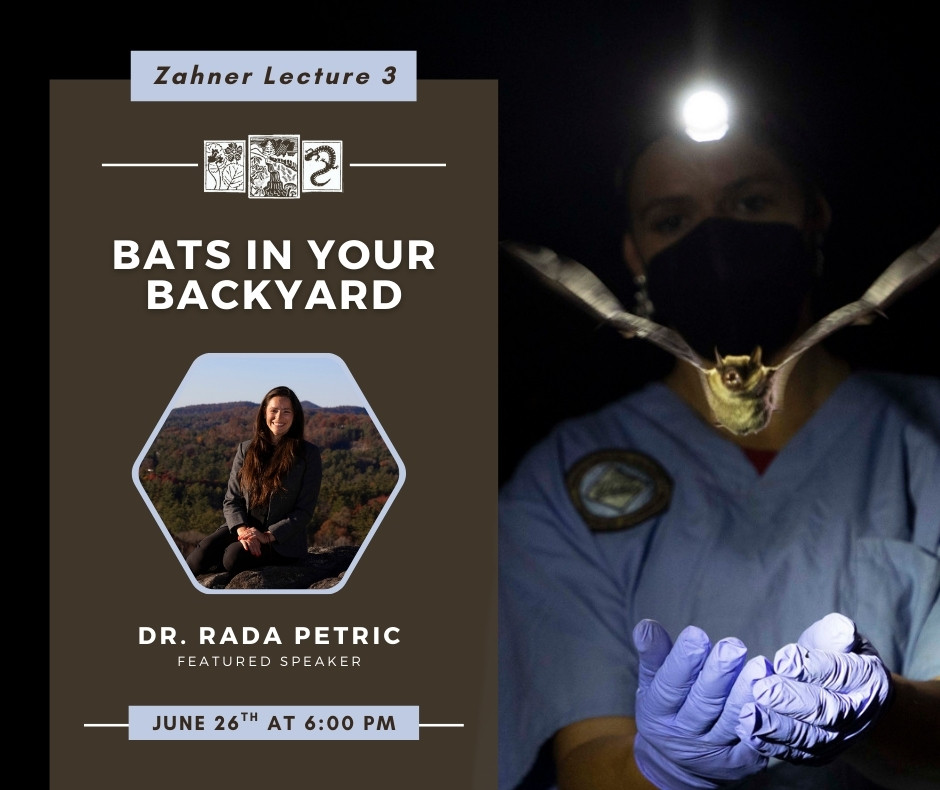
LECTURE 3
Bats in Your Backyard
Featured Speaker
Rada Petric, Assistant Research Professor and Director of the UNC IE Highlands Field Site, UNC Institute for the Environment
Date: Thursday, June 26th (revised date)
Time: 6pm – 7pm
Cost: FREE
Sponsored by Mary Todd & Jimmy Davis, Nancy & Lyle Nichols, and Miriam & Vernon Skiles.
Urbanization, landscape modification and concomitant pollutants (sound, light, and chemical compounds) alter the natural landscape which in turn influences animal behavior, biology, and survival. Sound, light and microplastics are emerging contaminants of interest. Due to the increased detection of these emerging contaminants, most habitats have become threatened. Despite the documented record of their occurrence in literature, there remains a great deal of mystery surrounding their occurrence’s ecological consequence. Her primary research interest is understanding how anthropogenic disturbances are altering community composition and reshaping ecosystems. Here, we discuss several studies focused on understanding how bats and small mammals respond to human disturbances.
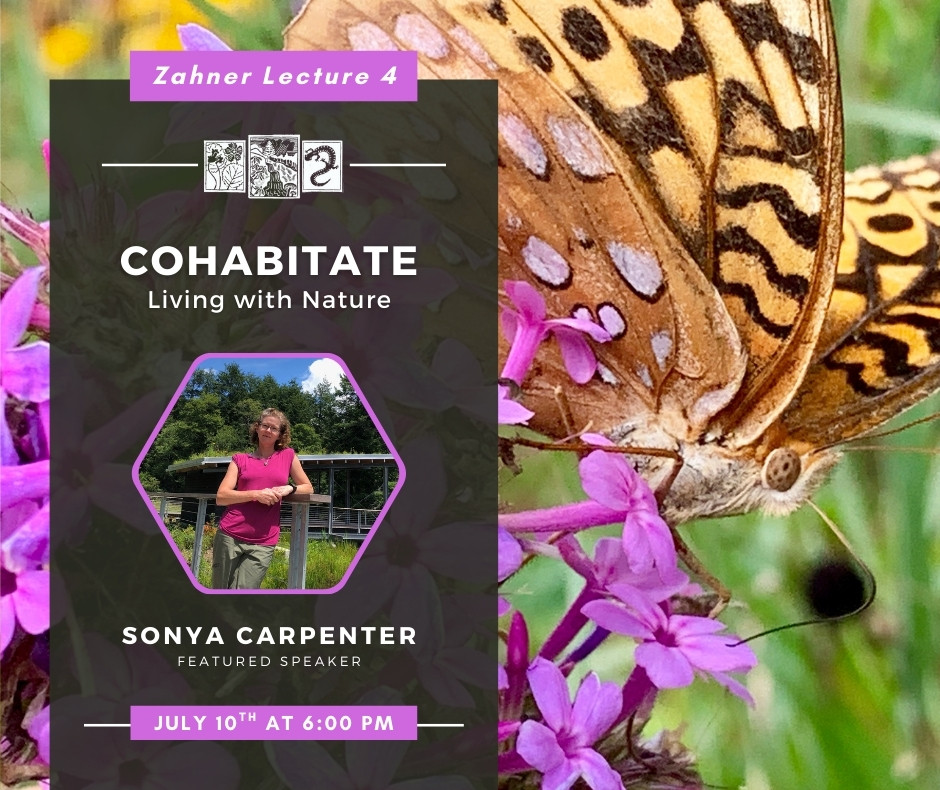
LECTURE 4
Cohabitate; Living with Nature
Featured Speaker
Sonya Carpenter, Co-founder and President of Co-habitate Inc.
Date: Thursday, July 10th (revised date)
Time: 6pm – 7pm
Cost: FREE
Sponsored by Jennie Stowers.
The Highlands Plateau is rich in biological diversity and appreciated for its natural beauty. Development pressure is increasing in Highlands, and threatens to have a negative impact on our natural resources. Therefore, neighbors must work together to ensure the natural resources we all appreciate such as clean air and water are protected. We as a community must create a culture in which native species are celebrated, encouraged, and harmoniously integrated into public and private landscapes. This is the vision for the new community-based organization, Co-habitate, which is dedicated to engaging and educating our neighbors on the intrinsic value of our ecosystem and seeking solutions to environmental degradation due to the pressures of development. Co-habitate co-founders Sonya Carpenter and Canty Worley have a vision for this work and hope to ensure that our plateau is a place where we can all reap the health benefits of nature. In this talk Sonya will introduce some of the activities, projects, and opportunities of this new initiative and offer ways that each of us can promote a healthier environment for humans and all of the other species who share the Highlands Plateau.
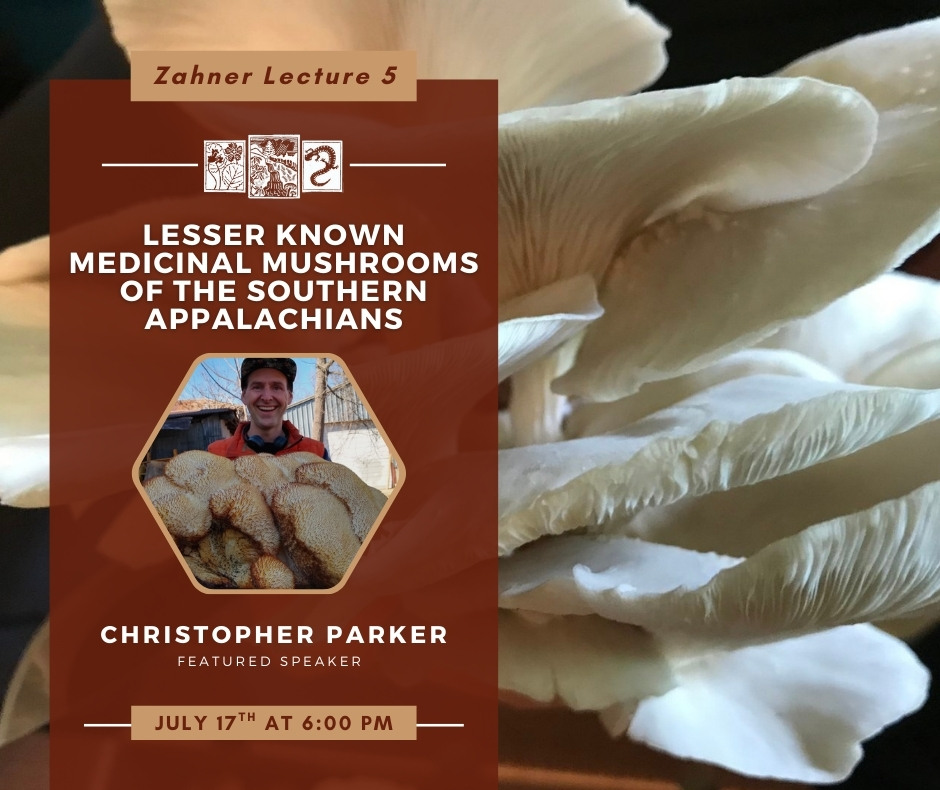
LECTURE 5
Lesser Known Medicinal Mushrooms of the Southern Appalachians
Featured Speaker
Christopher Parker, Mycologist and Co-Owner The Forest Farmacy
Date: Thursday, July 17th
Time: 6pm – 7pm
Cost: FREE
Sponsored by Vicki & Donny Ferguson.
Discover the medicinal properties of six lesser known mushrooms native to our eastern woodlands. A few mushrooms being discussed in this class are Schizopyllum, Maitake, and Birch Polypore where participants will learn what species have antibiotic, antioxidative, and anti-inflammatory properties from an experienced mycologist.
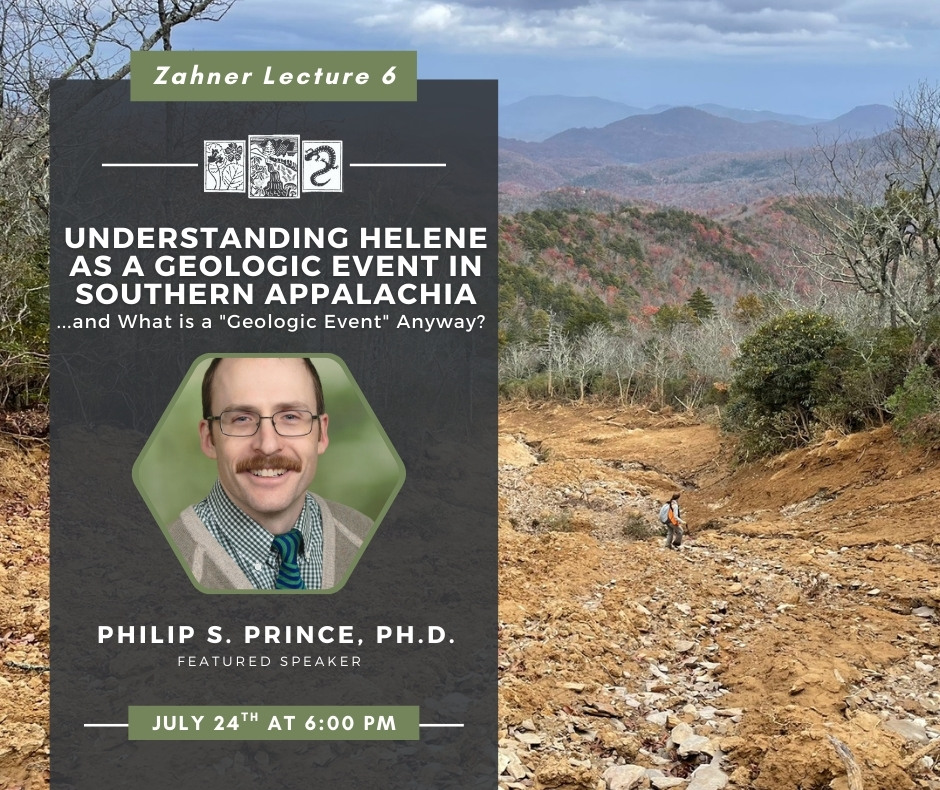
LECTURE 6
Understanding Helene as a Geologic Event in Southern Appalachia...and What is a "Geologic Event" Anyway?
Featured Speaker
Philip S. Prince, Ph.D., Project Geologist, Appalachian Landslide Consultants, PLLC, Virginia Tech Department of Geosciences
Date: Thursday, July 24th
Time: 6pm – 7pm
Cost: FREE
Sponsored by Ruthie & Berry Edwards.
Helene’s impacts on rivers and slopes in the southern Appalachians exceeded all recorded storms, establishing a new benchmark for flooding and landsliding from Haywood County to southwest Virginia. The storm’s severity resulted from a specific combination of weather movement and the unique southern Appalachian topography, whose southeast-facing slopes are perfectly oriented to focus impacts of weather systems from the Gulf. This talk will place the Helene event in a geologic and topographic context, focusing on what the storm actually did to the landscape and river channels from the perspective of fieldwork and remote sensing. LiDAR imagery and the results of past storms will shed some light on just how long the scars of Helene may last and offer some insight into just how important similar storms may have been in shaping the mountains into what we see today.
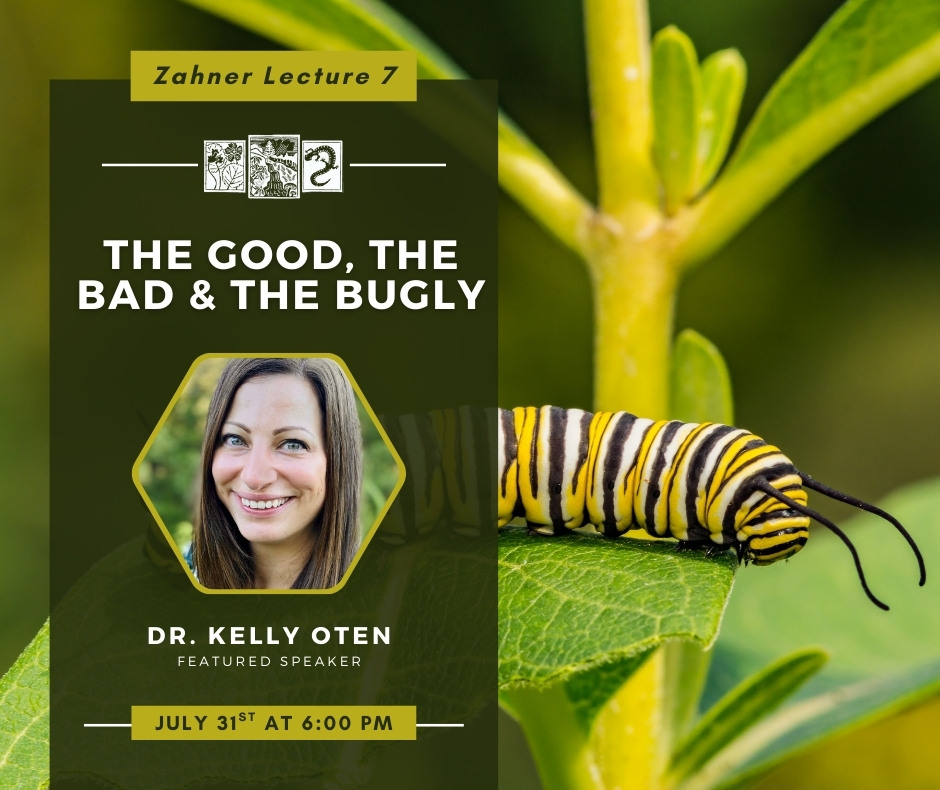
LECTURE 7
The Good, the Bad & the BUGly
Featured Speaker
Dr. Kelly Oten, Assistant Professor and Extension Specialist, NC State University
Date: Thursday, July 31st
Time: 6pm – 7pm
Cost: FREE
Sponsored by Suzanne & Don Duggan, Julie & Charlie Shefeldt, Ruthie & Franko Oliver, Margaret Waters, Adele & Nick Scielzo, and Florence & Tom Holmes.
Insects are all around us and play very important roles in our forest ecosystems. But they can also be pests, damaging trees and impacting our lives. Join Dr. Kelly Oten, a forest entomologist at NC State, to find out when to worry about a tree pest and what to do when things get a little bit bugly.
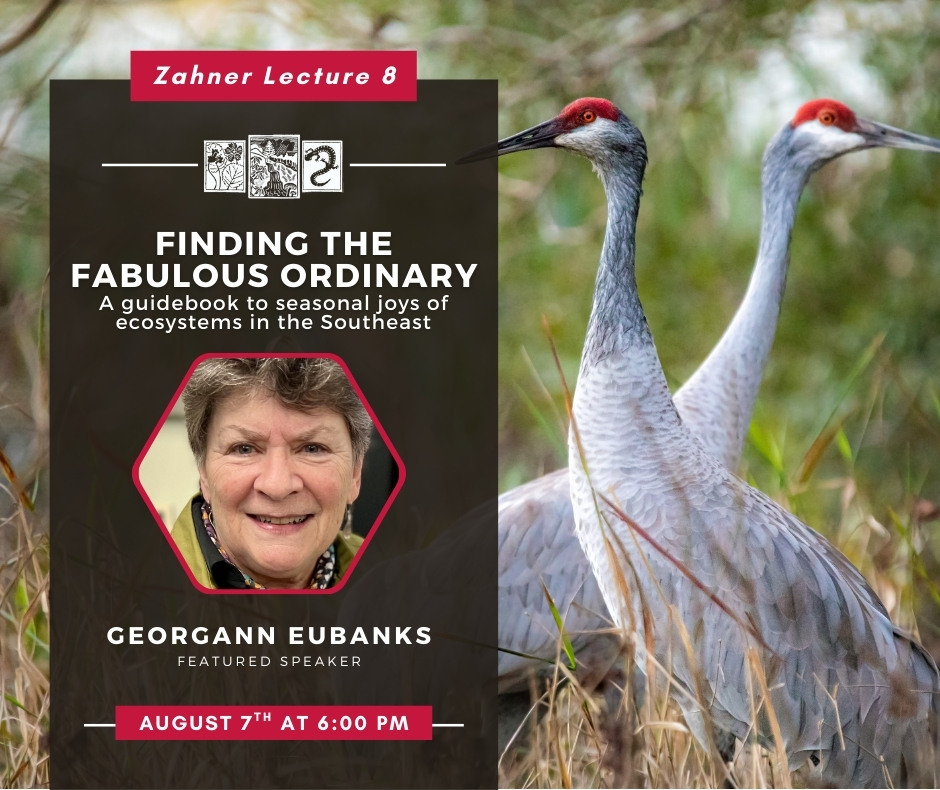
LECTURE 8
Finding the Fabulous Ordinary
Featured Speaker
Georgann Eubanks, author, University of North Carolina Press
Date: Thursday, August 7th
Time: 6pm – 7pm
Cost: FREE
Sponsored by Kim & Rich Daugherty and Kathy & Bestor Ward.
Nature writer Georgann Eubanks gives us a guidebook to the spectacular seasonal joys of ecosystems in the Southeast. The destinations and events she explores in her latest work are scattered across seven states. They include such wonders as bugling elk in the Smokies, a half-million purple martins roosting on an island in a South Carolina lake in July, the bloom of thirty acres of dimpled trout lilies in a remote Georgia forest in February, and gnat larvae that glow like stars on the rock walls of an obscure Alabama canyon. These magical sites are great destinations to visit with children, inspiring wonder and the impulse for protection.
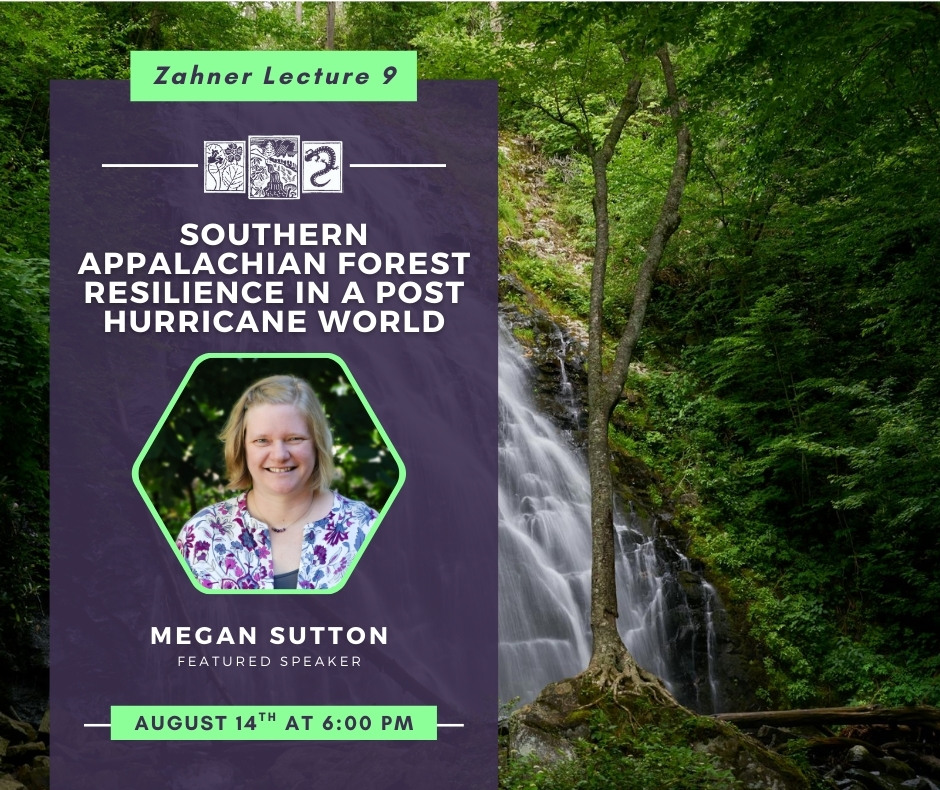
LECTURE 9
Southern Appalachian Forest Resilience in a Post Hurricane World
Featured Speaker
Megan Sutton, The Nature Conservancy, Southern Blue Ridge Program Director
Date: Thursday, August 14th
Time: 6pm – 7pm
Cost: FREE
Sponsored by Martha & Michael Dupuis, Monte & Palmer Gaillard, and Melanie & Tom Mauldin.
Join Megan Sutton from TNC’s Asheville office for an insightful program on the threats as well as the hopeful opportunities that our beloved Southern Appalachian forests face in the aftermath of Hurricane Helene. She will explore the extensive damage caused by the hurricane and will highlight both the immediate and long-term impacts on forest ecosystems. Megan will discuss the critical nature of forest recovery work and how TNC is working to help the forests adapt in a changing climate.
View lectures from previous years:
Parking
Please note that parking is limited on campus. Parking can be found behind and across from the Highlands Nature Center (930 Horse Cove Rd), in the Valentine House parking lot (888 Horse Cove Rd), and at our admin. building (265 N. 6th Street). For those who are able, some parking is available at our North Campus area (111 Lower Lake Rd) with a ~15 to 20 minute hike to the Nature Center. After 5:30 p.m., parking is also available at Hudson Library (554 Main St.) with a ~15 to 20 minute hike to the Nature Center along Horse Cove Rd (note that the sidewalk switches to the opposite side of the road once you reach 6th Street, so please use caution as you cross the street).
